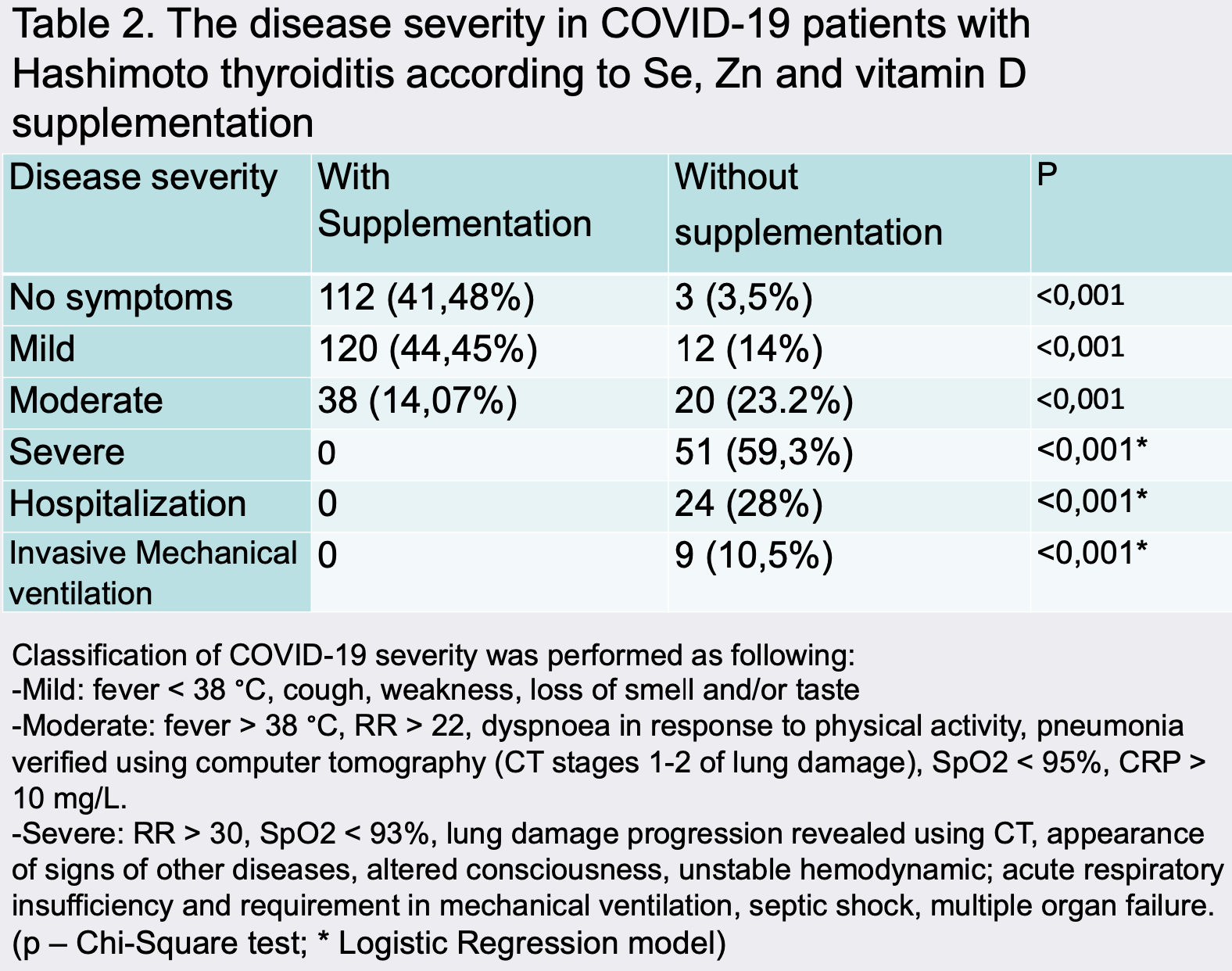
Selenium, zinc, and vitamin D supplementation affect the clinical course of COVID-19 infection in Hashimoto’s thyroiditis
et al., Endocrine Abstracts, doi:10.1530/endoabs.73.PEP14.2, May 2021
Retrospective 356 Hashimoto's thyroiditis outpatients, 270 taking vitamin D, zinc, and selenium, showing significantly lower hospitalization with treatment. Authors adjust for age, gender, BMI, and smoking status, reporting statistically significant associations with p<0.001 for hospitalization and mechanical ventilation, however they do not report the adjusted risks.
This study is excluded in meta-analysis:
combined treatments may contribute more to the effect seen; excessive unadjusted differences between groups.
|
risk of mechanical ventilation, 97.4% lower, RR 0.03, p < 0.001, treatment 0 of 270 (0.0%), control 9 of 86 (10.5%), NNT 9.6, relative risk is not 0 because of continuity correction due to zero events (with reciprocal of the contrasting arm), unadjusted.
|
|
risk of hospitalization, 99.0% lower, RR 0.010, p < 0.001, treatment 0 of 270 (0.0%), control 24 of 86 (27.9%), NNT 3.6, relative risk is not 0 because of continuity correction due to zero events (with reciprocal of the contrasting arm), unadjusted.
|
|
risk of severe case, 99.5% lower, RR 0.005, p < 0.001, treatment 0 of 270 (0.0%), control 51 of 86 (59.3%), NNT 1.7, relative risk is not 0 because of continuity correction due to zero events (with reciprocal of the contrasting arm), unadjusted.
|
| Effect extraction follows pre-specified rules prioritizing more serious outcomes. Submit updates |
Asimi et al., 22 May 2021, retrospective, Bosnia and Herzegovina, preprint, 3 authors, this trial uses multiple treatments in the treatment arm (combined with vitamin D and zinc) - results of individual treatments may vary.
Abstract: See discussions, stats, and author profiles for this publication at: https://www.researchgate.net/publication/351652823
Selenium, zinc, and vitamin D supplementation affect the clinical course of
COVID-19 infection in Hashimoto s thyroiditis
Article in Endocrine Abstracts · May 2021
DOI: 10.1530/endoabs.73.PEP14.2
CITATION
READS
1
650
3 authors:
Zelija Velija Asimi
Almira Hadžović-Džuvo
Sarajevo School of Science and Technology, Medical school
University of Sarajevo
53 PUBLICATIONS 342 CITATIONS
70 PUBLICATIONS 341 CITATIONS
SEE PROFILE
SEE PROFILE
Djinan Al-Tawil
Policlic and daily hospital dr.Al-Tawil
3 PUBLICATIONS 2 CITATIONS
SEE PROFILE
Some of the authors of this publication are also working on these related projects:
PUBLIC HEALTH IN THE WESTERN BALKANS – IMPROVEMENT IN THE FIELD OF PUBLIC HEALTH AND DEVELOPMENT OF A “ONE HEALTH” EDUCATIONAL AND SCIENTIFIC
ARCHITECTURE IN WESTERN BALKAN COUNTRIES (project ID: EACEA-544182: 544182-TEMPUS-1-2013-1-IT-TEMPUS-JPCR) View project
Genetic factors of thromborhilia in pregnancy loss, Crohn disease View project
All content following this page was uploaded by Zelija Velija Asimi on 23 May 2021.
The user has requested enhancement of the
PEP14.2
Selenium, zinc, and vitamin D supplementation affect the clinical course of COVID-19 infection in
Hashimoto's thyroiditis
Zelija Velija Asimi1,2, Almira Hadzovic-Dzuvo1,3, Djinan Al-Tawil1
1Outpatient Clinic with a Daily hospital "Dr Al Tawil", Sarajevo, 2Sarajevo Medical School, SSST University, 3Sarajevo University,
Bosnia and Herzegovina
Adequate supply of zinc, selenium, and vitamin D is essential
for resistance to other viral infections, immune function, and
reduced inflammation. Low levels of micronutrients are
associated with adverse clinical outcomes during viral
infections. Vitamin D improves the physical barrier against the
virus and stimulates the production of antimicrobial peptides. It
can prevent cytokine storms by reducing the production of
inflammatory cytokines. Selenium enhances the function of
cytotoxic effector cells. Furthermore, selenium is important for
maintaining T cell maturation and function, as well as for
producing T cell-dependent antibodies.
Our goal was to determine the effects of selenium, zinc, and
vitamin D supplementation on recovery from COVID-19 in
patients with pre-existing Hashimoto’s thyroiditis.
CONCLUSION
For the treatment of people with Hashimoto’s
thyroiditis who become infected with COVID-19,
the addition of selenium, zinc, and vitamin D3
could be beneficial. Randomized controlled trials
and large population studies should be performed
to evaluate these recommendations.
Reference:
1.
Alexander J, Tinkov A, Strand TA, Alehagen U, Skalny A, Aaseth J. Early
Nutritional Interventions with Zinc, Selenium and Vitamin D for Raising Anti-Viral
Resistance Against Progressive COVID-19. Nutrients. 2020 Aug 7;12(8):2358. doi:
10.3390/nu12082358. PMID: 32784601; PMCID: PMC7468884.
2.
Bae M, Kim H. Mini-Review on the Roles of Vitamin C, Vitamin D, and
Selenium in the Immune System against COVID-19. Molecules. 2020 Nov
16;25(22):5346. doi: 10.3390/molecules25225346
3.
Im JH, Je YS, Baek J, Chung MH, Kwon HY, Lee JS. Nutritional status of
patients with COVID-19. Int J Infect Dis. 2020 Nov;100:390-393. doi:
10.1016/j.ijid.2020.08.018. Epub 2020 Aug 11.
4.
Heller RA, Sun Q, Hackler J, Seelig J, Seibert L, Cherkezov A, Minich WB,
Seemann P, Diegmann J, Pilz M, Bachmann M, Ranjbar A,..
DOI record:
{
"DOI": "10.1530/endoabs.73.pep14.2",
"ISSN": [
"1479-6848"
],
"URL": "http://dx.doi.org/10.1530/endoabs.73.PEP14.2",
"author": [
{
"affiliation": [],
"family": "Velija",
"given": "Asimi Zelija",
"sequence": "first"
},
{
"affiliation": [],
"family": "Almira",
"given": "Hadzovic-Dzuv",
"sequence": "additional"
},
{
"affiliation": [],
"family": "Al",
"given": "Tawil Djinan",
"sequence": "additional"
}
],
"container-title": "Endocrine Abstracts",
"container-title-short": "EJEA",
"content-domain": {
"crossmark-restriction": false,
"domain": []
},
"created": {
"date-parts": [
[
2021,
5,
17
]
],
"date-time": "2021-05-17T13:19:11Z",
"timestamp": 1621257551000
},
"deposited": {
"date-parts": [
[
2022,
7,
14
]
],
"date-time": "2022-07-14T01:48:24Z",
"timestamp": 1657763304000
},
"indexed": {
"date-parts": [
[
2022,
7,
14
]
],
"date-time": "2022-07-14T11:41:42Z",
"timestamp": 1657798902062
},
"is-referenced-by-count": 0,
"issued": {
"date-parts": [
[
2021,
5,
15
]
]
},
"link": [
{
"URL": "http://www.endocrine-abstracts.org/ea/0073/ea0073pep14.2.htm",
"content-type": "unspecified",
"content-version": "vor",
"intended-application": "similarity-checking"
}
],
"member": "416",
"original-title": [],
"prefix": "10.1530",
"published": {
"date-parts": [
[
2021,
5,
15
]
]
},
"published-online": {
"date-parts": [
[
2021,
5,
15
]
]
},
"publisher": "Bioscientifica",
"reference-count": 0,
"references-count": 0,
"relation": {},
"resource": {
"primary": {
"URL": "http://www.endocrine-abstracts.org/ea/0073/ea0073pep14.2.htm"
}
},
"score": 1,
"short-title": [],
"source": "Crossref",
"subject": [
"General Medicine"
],
"subtitle": [],
"title": "Selenium, zinc, and vitamin D supplementation affect the clinical course of COVID-19 infection in Hashimotos thyroiditis",
"type": "journal-article"
}
asimi